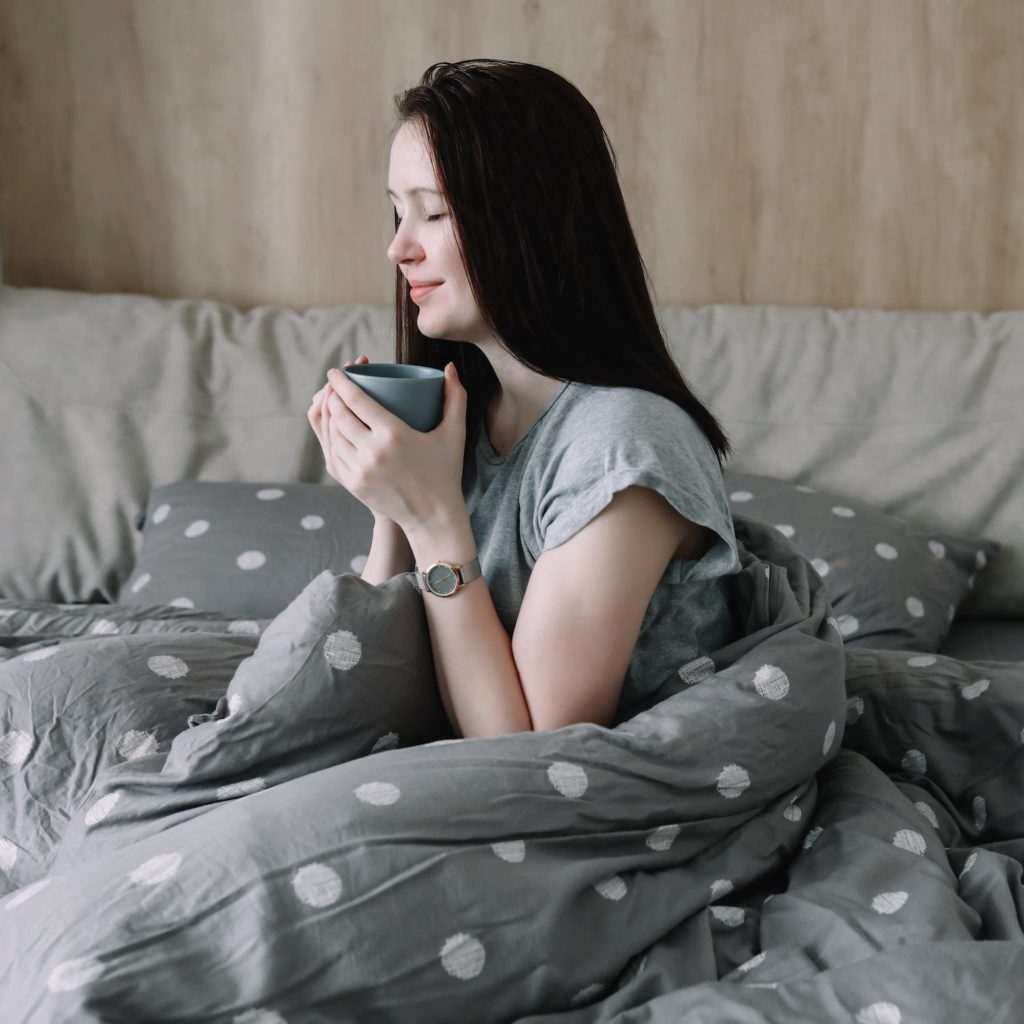As a stimulant, caffeine generates energy and alertness that may interfere with sleep and contribute to insomnia. Caffeine concentrations can persist in the body for hours, so drinking caffeinated coffee, tea, or energy drinks in the afternoon or evening may make it harder to sleep well at night.
Given that nearly 90% of adults regularly consume some form of caffeine, it’s important to understand the relationship between caffeine and insomnia.
Caffeine and Insomnia
Caffeine improves focus and helps people feel more alert, even when they’re tired. As a result, caffeine can often reduce symptoms of sleep deprivation like drowsiness and difficulty paying attention. However, caffeine can also disrupt normal sleep and increase the risk of insomnia, especially when people consume it in high doses or at the wrong times.
How Does Caffeine Affect the Body?
Caffeine is a stimulant that boosts energy levels and heightens wakefulness. It works by blocking the effects of a sleep-inducing substance in the body called adenosine.
Adenosine accumulates in the bloodstream when you’re awake, and then your body clears it away when you sleep. A buildup of adenosine can cause sleepiness, which is why you tend to get progressively more tired the longer you’ve been awake.
Caffeine blunts this effect by blocking adenosine receptors in the nervous system. This can keep the brain and body from recognizing the need for sleep.
The stimulant effect of caffeine can have a prolonged effect that may lead to sleep disruptions. Poor sleep may cause tiredness that prompts greater caffeine intake, which can then further disrupt sleep. This can create a mutually reinforcing cycle of insufficient sleep and caffeine consumption. Over time, this can raise the risk of developing insomnia.
Caffeine doesn’t just promote wakefulness and increase energy. Because it affects multiple systems of the body, caffeine can cause side effects that may interfere with sleep by themselves, including:
- Frequent urination
- Heartburn
- Upset stomach
- Jitters
The exact physical and mental effects may depend on the dose of caffeine and an individual’s sensitivity.
How Long Does Caffeine Stay in Your System?
Caffeine can stay in your system for many hours, and its effects may last up to eight hours after you consume it. Even after the effects wear off, caffeine may remain in the body for several hours. This means that afternoon or evening caffeine consumption may make it harder to fall asleep or stay asleep through the night.
Caffeine takes effect quickly and reaches its maximum concentration around an hour after consumption. After that, its half-life is approximately four hours. The half-life is the amount of time it takes the concentration of caffeine in the body to reduce by half. However, some people’s bodies may naturally metabolize caffeine faster or slower, depending on their genetics
Several other factors can affect how the body processes caffeine.
- Pregnancy: The half-life of caffeine may double during the third trimester of pregnancy.
- Tobacco smoking: Evidence indicates that cigarette smokers metabolize caffeine up to 50% faster than nonsmokers.
- Health conditions: Caffeine may linger longer for people with impaired liver function. Some medications may also affect sensitivity to caffeine.
To prevent sleep problems like insomnia, experts recommend avoiding caffeine for eight hours or more before bedtime. To be even more cautious, it may be best to restrict caffeine use to the morning hours.
Can Caffeine Withdrawal Cause Insomnia?
Insomnia is not a typical symptom of caffeine withdrawal, which can occur when people abruptly quit caffeine. In fact, people who stop using caffeine often feel more drowsy. However, they may also have other symptoms, such as headaches or mood changes, that could potentially affect their sleep.
Withdrawal symptoms typically begin after 12 to 24 hours without caffeine. Withdrawal usually feels the worst in the first couple of days, but symptoms can linger for over a week. The most common signs of withdrawal include:
- Headache
- Drowsiness or fatigue
- Difficulty staying alert and focused
- Feeling depressed or anxious
- Irritable mood
- Nausea
Not everyone experiences withdrawal when they stop using caffeine. Studies suggest that only about half of those who suddenly give up caffeine have withdrawal symptoms. For some people, gradually reducing caffeine intake over the course of a week may help prevent withdrawal.
Sources of Caffeine
Coffee and tea are among the most widely used products that can contain caffeine. Other common sources of caffeine include:
- Soft drinks
- Energy drinks
- Chocolate and hot cocoa
- Fitness and energy supplements
- Yerba mate
- Coffee-flavored ice cream
- Some over-the-counter pain medications
Regardless of its source, caffeine can impact sleep because of how it affects the nervous system. That said, not all sources deliver the same amount of caffeine. Some products such as coffee and tea also come in decaffeinated versions containing significantly reduced levels of caffeine.
Signs of Too Much Caffeine
Exceeding the daily recommended caffeine intake level can lead to a variety of unpleasant consequences. Along with sleep problems, signs of too much caffeine can include:
- Anxiety
- Palpitations
- Racing pulse
- Elevated blood pressure
- Jitteriness
- Headache
- Nausea, vomiting, or diarrhea
- Increased thirst
- Frequent urination
Caffeine overdose is a very rare occurrence. However, when consumed in amounts that are toxic to the body, caffeine can lead to irregular heartbeat or seizures and may even require a trip to the hospital. Depending on the severity of symptoms, a caffeine overdose may be treated with intravenous fluids, heart monitoring, and anti-anxiety medicine.
People who regularly consume caffeine are typically less likely to feel its negative effects. Despite this, even daily coffee or tea drinkers should know the signs of excess caffeine intake and talk with their doctor if they’re concerned about their caffeine use.
Recommended Caffeine Intake
Most adults can safely consume up to 400 milligrams of caffeine a day. However, some people may be more or less susceptible to caffeine’s effects. Your doctor is in the best position to provide guidance about how much caffeine is safe for you.
It’s a good idea to be familiar with the way caffeine impacts your personal sleep patterns. If you’ve been avoiding caffeine for eight hours before bed and still feel jittery at night or have trouble falling asleep, you might consider using less caffeine or cutting it out even earlier in the day.
You may also want to consume less caffeine if you:
- Have a known sleep disorder
- Are pregnant or breastfeeding
- Have high blood pressure or an abnormal heartbeat
- Experience anxiety or panic attacks
- Take a medication that interacts with caffeine
- Have acid reflux or heartburn
- Have frequent headaches
Talk to your health care provider if you have any questions about caffeine and your health conditions or medications.
Switching to decaf might seem like an obvious solution when you want to reduce your caffeine intake. However, decaffeinated coffees and teas still contain a small amount of caffeine. If you’re trying to avoid caffeine altogether, these beverages may not be the best alternative.
| Product | Serving Size (ounces) | Caffeine (milligrams) |
|---|---|---|
| Brewed coffee | 8 | 102-200 |
| Instant coffee | 8 | 27-173 |
| Decaffeinated coffee | 8 | 3-12 |
| Espresso | 1 | 30-90 |
| Decaffeinated espresso | 1 | 4 |
| Black tea | 8 | 40-120 |
| Green tea | 8 | 40-120 |
| Regular or diet cola | 12 | 0-71 |
| Energy drink | Varies | 48-500 |
| Coffee ice cream | 8 | 50-84 |
| Chocolate bar | 1.55 | 9-31 |
| Hot cocoa | 8 | 3-13 |
How to Counteract Caffeine Insomnia
Because caffeine can have a lasting stimulant effect, it can get in the way of your sleep and raise your risk of insomnia. Several lifestyle changes can help reduce the chances that caffeine will cause or exacerbate sleep problems.
- Establish a caffeine cutoff time: Decide what hour of the day you will stop consuming caffeine and stick to it. Experts often suggest keeping away from caffeine for at least eight hours before bed, but you can adjust this based on your own sensitivity to caffeine.
- Be aware of your intake: Keep track of how many caffeinated products you’re consuming and the likely dose of caffeine in each. Remember that caffeine can be found in many foods and drinks, so consider your overall nutrition and how it may be impacting your sleep.
- Limit alcohol consumption: Like caffeine, alcohol is a commonly used drug that can disrupt the quality of your sleep.
- Quit smoking: Nicotine is a stimulant like caffeine, and it can also throw off your sleep, including by reducing the amount of deep sleep you get at night.
- Maintain a consistent bedtime routine: Try to go to sleep and get up at the same times every day. Before bed, unwind by doing something relaxing that puts you in the right mindset for sleep.
- Stop tossing and turning: If you find that you’re having a hard time falling asleep, don’t keep lying awake in bed. After 20 minutes, get up and do something quiet and calming until you feel sleepy and can return to bed to fall asleep.
If you have sleep problems that are long-lasting or causing negative effects when you are awake, you may want to consult a doctor who can assess your sleep habits and medical history. If necessary, your doctor can also recommend appropriate tests to check for causes of insufficient sleep.
References
Ask the Sleep Doctor
Have questions about sleep? Submit them here! We use your questions to help us decide topics for future articles, videos, and newsletters. We try to answer as many questions as possible. You can also send us an email. Please note, we cannot provide specific medical advice, and always recommend you contact your doctor for any medical matters.








